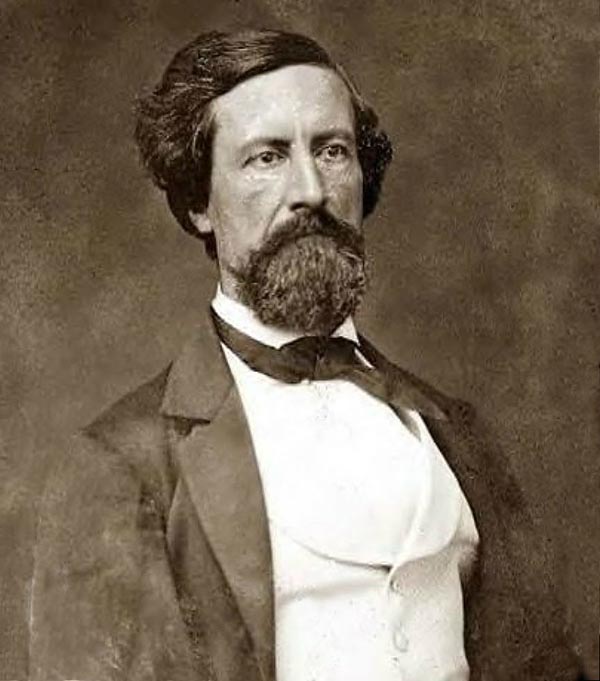John Clifford Pemberton (August 10, 1814 - July 13, 1881) was served as an officer in the United States Army and then as a general in the Confederate Army during the American Civil War. Born in Philadelphia, Pennsylvania, Pemberton attended the United States Military Academy at West Point from 1833 - 1837 and was commissioned a second lieutenant in the 4th U.S. Artillery Regiment upon graduation. He and his unit participated in the Second Seminole War in 1837 and 1838 and fought in Florida at the Battle of Locha-Hatchee on January 24, 1838. He then served at different installations all over the United States with the 4th Artillery, before being stationed as part of the U.S. military occupation of Texas before the Republic of Texas was admitted to the Union as the 28th state in 1845. Pemberton and the 4th Artillery were then sent to Mexico to fight in the Mexican-American War and fought in several battles in 1846 including the Battle of Palo Alto, the Battle of Resaca de la Palma, and the Battle of Monterrey, after which he was appointed a brevet captain. In 1847, Pemberton and the 4th Artillery participated in General Winfield Scott's offensive across Mexico, from the Siege of Vera Cruz through the Battle of Cerro Gordo, the Battle of Churubusco, and the Battle of Molino del Rey. After Molino del Rey, Pemberton was again promoted, this time to brevet major. Pemberton then took part in the Battle of Chapultepec and the Battle of Mexico City, where he was wounded. At the time, Pemberton was serving as the aide-de-camp to Brevet Brigadier General William J. Worth, a position he held from August 4, 1846 until May 1, 1849, on the same staff as his future opponent in the U.S. Civil War Ulysses S. Grant. After the war, Pemberton remained in the army and served at posts from Florida to Minnesota to New Mexico, finally ending up at the Washington Arsenal in Washington, D.C. in April 1861 at the beginning of the Civil War. At the outbreak of the Civil War, Pemberton chose to resign his commission in the U.S. Army to support the Confederacy, even though he had been born in the North and his two younger brothers were already serving in the Union Army. His decision was due to the influence of his Virginia-born wife and having served throughout the South during the antebellum years. Pemberton quickly rose through the ranks and was promoted to brigadier general by mid-June 1861. He served throughout the South, but he is known for being the commander of the fortress city of Vicksburg, which he surrendered to General Grant on July 4, 1863. Pemberton then was a Union prisoner until he was exchanged on October 13, 1863, and spent the following eight months in Richmond without an assignment, before resigning as a general officer to serve as a lieutenant colonel in the artillery. After the war, Pemberton lived on a farm near Warrenton, Virginia, from 1866 until 1876, when he moved back to Pennsylvania. Pemberton died on July 13, 1881, and was buried at Laurel Hill Cemetery in Philadelphia, a fact that garnered protest from Union General George Meade and Union Admiral John A. Dahlgren. Publicly at the time it was stated that the decision was made to not bury Pemberton at Laurel Hill, but he was in fact buried there in an obscure part of the cemetery.


